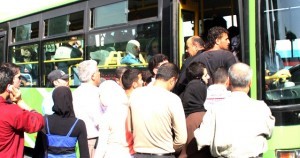A Bitter Winter Ahead in Syria

Rising fuel prices have crippled public transport as people prepare to keep warm over the coming months.
Queues of commuters line Damascus’ streets and pavements.
Some are waiting for buses. Others have given up and have decided to walk to work. Public transport has ground to a halt since the souring cost of diesel forced the city’s bus drivers to give up work.
“We can’t afford taxis,” Leila, 43, said as she waited at a bus stop. “Prices are skyrocketing. We don’t have any money, what are we supposed to do? We work from morning to night and what we make only covers the cost of food. How are we supposed to live?”
“It’s all worth it for the president,” Mohammad, 36, replied sarcastically. “Survive and carry on, citizens. [We] continue to be

humiliated by the authorities who don’t care if you get to your college or your work on foot or by bus.”
In the midst of the ongoing civil war, the Syrian government has increased the price of gas and diesel. A litre of diesel has gone up from 60 to 80 Syrian pounds [0.35 to 0.45 US dollars]. Gasoline now costs 140 pounds [0.82 US dollars], up from 120 [0.70 US dollars]. The government blames the price hike on the lack of fuel in various governorates, a thriving black market, and the frequent power cuts caused by the shelling of power stations.
“We used to wait for bonuses from the government, not new crises,” Jawad, 52, a bus driver on the route between Jaramana and Karaj al-Sitt, said. “People protest because we are not working. How are we supposed to work with these insane prices? Even if we decided to work, diesel is often unavailable. And when it is available, we sometimes have to wait for two hours to fill up our tanks.”
Taxi drivers do not fare much better. The increase in petrol prices has forced some to remove their meters.
“Does the average citizen want us to stick with the meter with these high prices?” Issam, a 28-year-old taxi driver, said. “They don’t know that we stop at each checkpoint for at least half an hour or an hour. In this traffic, constantly stepping on the accelerator leaves the gas tank empty.”
The fuel price rise has pushed up the cost of public transport. Bus fares now cost five pounds more than before while journeys by taxi are left to the discretion of drivers.
Meanwhile traders are worried about the knock-on effect for the cost of food and other essential items like clothing.
Alaa, a 22-year-old art student, told Damascus Bureau that his father has had to shut down his small bakery because of higher fuel prices.
“The monthly amount of diesel needed to keep the shop running costs up to 120,000 pounds [around 700 US dollars],” he said, adding that the price of flour has risen exponentially and is now set by individual traders.
“As a result, many small business owners had to shut up shop either temporarily or permanently.”
The rise in fuel prices reflects a painful reality for Syrians who have suffered through a war that is now in its fourth year. They are now bracing themselves for winter.
Hajj Mohammad, 60, who lost his home in the Damascus suburb of al-Mleeha and now lives in Jaramana was in the same position last year.
“Last winter we relied on thick clothes and wool blankets to keep us warm,” he told Damascus Bureau. “The power cuts were constant and we were unable to secure any diesel fuel. It seems as though we will go through the same thing this year.”
With few options, Syrians have been looking for alternative ways to keep warm. Some have turned to logging to make up for the lack of electricity and diesel, particularly in areas close to forests.
Logging became common practice last winter. People carried their axes and transported what they were able to cut down in their cars or on their motorcycles. Wealthier people bought electric saws.
But an increased reliance on logging has put pressure on the environment with whole areas of the country suffering from deforestation. According to the United Nations Food and Agriculture Organisation (FAO), only 1.4% of Syrian land is forested.
Before the war began three and a half years ago, forest patrols protected the woodlands and prevented unlicensed logging but these are no longer in place.
Using wood instead of diesel also does not solve the problem as prices are also high.
“The price of wood ranges from 8,000 to 12,000 pounds [50 to 70 US dollars], according to the type of tree,” Rida, 41, a wood trader said. “The wood trade boomed last year, as it will this year. The dependence on wood has allowed some to take advantage of people’s need and control the prices. Some have opened up wood workshops to cut logs that they sell at whatever price they like.”
As Syrians prepare for another winter and the further challenges to daily life that it brings, some are reminded of much happier times from the past.
“I remember when we were little and didn’t have any electricity,” Oum Rachid, 90, said, recalling her childhood. “Before we began to use diesel, we would warm ourselves by burning wood. Each family would gather into one room around the fireplace. It makes me happy to relive some of this beautiful past. It was a warm past, despite life’s cruelty,” she said.
